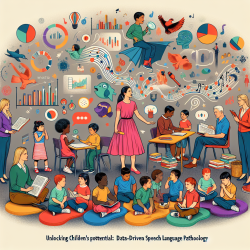As a special education director, you're likely aware of the increasing role of virtual therapy in educational settings. But how can you ensure that your online interactions are as effective as possible? The research paper titled "Attending to Eliza: rapid brain responses reflect competence attribution in virtual social feedback processing" offers valuable insights that can help you enhance your virtual therapy skills.
In this study, researchers investigated how attributed sender expertise affects the processing of online feedback. Participants were told they would receive feedback from either an expert psychotherapist, a layperson, or a randomly acting computer. Despite the feedback being identical, brain responses varied significantly based on the perceived competence of the sender.
Key findings include:
- Rapid Response to Expertise: Brain responses were faster and more pronounced when feedback was attributed to an expert, starting as early as 150 milliseconds after feedback disclosure.
- Enhanced Processing for Human Senders: Feedback from human senders (both expert and layperson) elicited larger brain responses compared to feedback from a computer.
- Significance of Neutral Feedback: Neutral feedback from an expert prompted larger brain responses than neutral feedback from a layperson, suggesting that perceived expertise can enhance the significance of even neutral content.
These findings highlight the importance of perceived competence in virtual interactions. Here are some practical tips to apply these insights to your virtual therapy sessions:
- Establish Your Expertise: Clearly communicate your qualifications and experience to build trust and enhance the perceived competence of your feedback.
- Be Consistent: Maintain a consistent and professional demeanor to reinforce your expertise over time.
- Personalize Feedback: Tailor your feedback to the individual needs of each student, which can further enhance the perceived value of your interactions.
By implementing these strategies, you can improve the effectiveness of your virtual therapy sessions and provide more impactful support to your students. To read the original research paper, please follow this link: Attending to Eliza: rapid brain responses reflect competence attribution in virtual social feedback processing.










